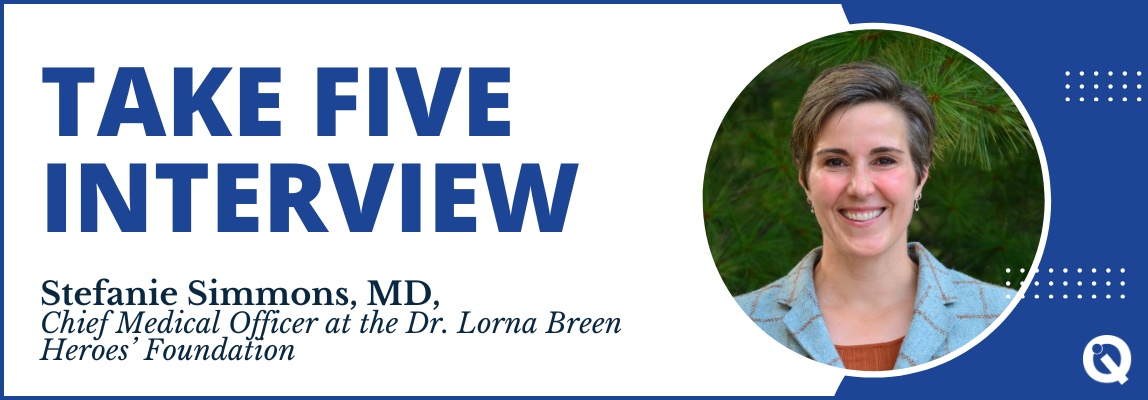Stefanie Simmons, MD, Chief Medical Officer at the Dr. Lorna Breen Heroes’ Foundation. The Quality Institute is partnering with the Foundation on the initiative, “ALL IN: Caring for New Jersey’s Caregivers.”
What is the story behind the creation of the Dr. Lorna Breen Heroes’ Foundation?
Lorna was a department chair of emergency medicine, at the top of her game in New York. She rose to the call to lead her team in caring for patients during the first wave of the pandemic. And she became physically, emotionally, and intellectually exhausted after caring for patients for weeks while also contracting COVID herself. She returned to her home state of Virginia and entered a hospital for mental health treatment. After receiving her first-ever mental health care, she expressed to her family that she was burdened by the worry that she would lose her license, her ability to be credentialed at her hospital, and the respect of her colleagues. Soon after she took her own life.
The New York Times published an article about Lorna and thousands of health care workers reached out to the family about the barriers health care workers face accessing mental health care. It was out of the response from the health care community that the Foundation was born.
Can you tell us about the Foundation’s Wellbeing First Champion Challenge program, which encourages hospitals to remove stigmatizing mental health questions from credentialing applications.
Our initiative, “ALL IN: Caring for New Jersey’s Caregivers,” starts with the Wellbeing First Champion Challenge to improve access to mental health care for health workers. We must remove invasive questions and stigmatizing language about mental health from licensing applications for health care workers at the state level. Additionally, hospitals, health systems, and medical groups need to remove stigmatizing language about mental health care from credentialing applications.
We treat mental health differently than physical health, even though both can be impairing. What we should be doing is asking about current impairment for any reason. That way we can keep patients safe without stigmatizing a specific type of medical care or discouraging people who are at risk for mental health conditions from seeking care they need. Look at how the questions are asked. Have you ever committed a felony? Are you a pedophile? Then they ask if you have ever sought mental health treatment. It’s highly stigmatizing.
Healthcare workers deserve care for depression, anxiety, PTSD and other mental health conditions without fear of licensing and credentialing repercussion. If someone is not actively impaired, and is getting treatment, there is no reason to ask them about their medical history.
New Jersey health systems, hospitals, and medical groups are encouraged to use the Foundation’s free resources to audit and change their credentialing applications and peer reference forms to be free of intrusive mental health questions and stigmatizing language. By then verifying the applications, they can be recognized as Wellbeing First Champions and can showcase how their organization is committed to protecting their health workers’ mental health.
What cultural shifts within health care organizations are needed so clinicians can seek mental health care without fear of professional repercussions?
During our training we’re selected for this perfectionism. You want someone to be perfect when they’re providing medical care. We need to talk to our trainees that you can be human and high quality at the same time. Meeting your very human needs will help you be a better clinician. There is internal stigma and external stigma. How do we talk about our patients with mental health conditions? Do we share stories with each other about our own mental health journeys? If you have a new diagnosis of diabetes, you might share that with your coworkers. We need to be as comfortable sharing stories of depression, anxiety, bipolar disorder, PTSD and other mental health conditions. I think The Pitt is an example of a show where the mental health component is very accurate. It’s realistic around some of the extreme stressors that caregivers, especially in the ER, face.
How does your background in emergency medicine shape your approach to clinician burnout and mental health?
I practiced emergency medicine for a decade and a half, and emergency medicine is a very interprofessional field. We work with our nursing teams very closely and with our pharmacists and all the different specialties in medicine. We know that if anyone on the team is struggling the whole team can be struggling. The issue of stress and mental wellbeing is especially apparent in emergency medicine. We are uniquely positioned to see gaps in the health care infrastructure and barriers keeping people from accessing care. That insight can be very helpful when thinking about how to design systems to better support the health care workforce as well.
We like to ask questions beyond a person’s professional life. Can you describe an experience in your life that significantly impacted who you are today?
I had two children in residency training, and I had a third child in my mid-career. And raising children, while caring for people in a medical setting, helped me to have a more holistic view of health and a better understanding of how to communicate. You’re trying to explain to someone who’s learning about what you do and why you do this work. Talking with children helps bring the failings of your communication into sharp relief and trains you to communicate better. And I see the positive generational shift on the view of mental health and treatment.

